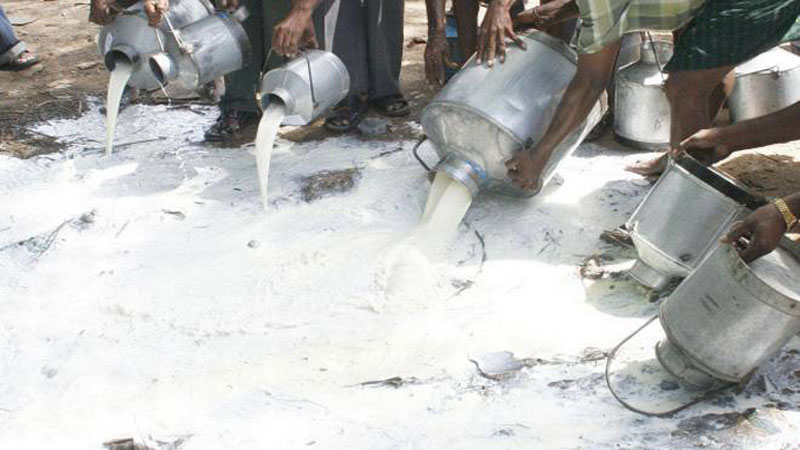FOOD ADULTERATION IN PAKISTAN AND ITS HEALTH IMPACTS
Food Adulteration is well-known as a major global problem. Deliberately cheating by combining low-cost and low-quality ingredients that are detrimental to human health, making an extra profit on the amount of quality food intended for sale is rampant in developing countries. Beverages, oil or ghee, baking products, spices, tea, sweets, bottled water, and especially milk and dairy products have been severely affected in Pakistan. Adulteration of milk is the most common type of adulteration in Pakistan and 80% of the total milk sold in tetra packs or in the loose form is adulterated. Hydrogen peroxide, carbonates, bicarbonates, antibiotics, caustic soda, and formalin have been confirmed in the milk as adulterants. Numerous studies have reported that various adulterants are added to commercial milk that reflects the quality of whole milk available to consumers in Pakistan.
Milk sold in Pakistan is low and has very low levels of nutrients and toxic compounds Starch causes diarrhea. Too much accumulation can be problematic for diabetics. Urea can damage a person’s kidneys. Oxytocin is used to increase milk yield which can damage human health. The major health scare associated with this is that some quantity of the hormone injected in cattle is also transmitted to the person drinking the cattle’s milk, which can cause problems related to eyes, kidney, heart, etc. Formalin has been noted that it is used to increase milk’s shelf-life. Consuming milk laced with formalin can cause skin problems and Cancer. Hydrogen peroxide cause anxiety related to the digestive system. Detergent can cause skin and kidney issues.
Most common adulterants in sugar and salt are chalk powder, white sand, Washing soda, Plastic crystals, Urea, White/ Yellow color, Rawan/ Sujit, Stones . Chalk powder is not toxic but when inhaled for long, may cause respiratory problems. Washing soda cause diarrhea, nausea and vomiting. With used tea leaves, dye or artificial color, iron fillings. Tea leaves are often adulterated with iron flakes to increase their weight. The chances of adulteration are more if we buy loose tea. Used tea from tea stalls is dried in the sun, mixed with coal tar dyes and some amount of genuine tea to give it flavor. Adulteration in tea powder can cause cancer, tetanus. Coffee considered an elite beverage is not abandoned. Combined with chicory powder, crushed tamarind and date seeds.
Tamarind seeds, powdered seeds of the date cause diarrhea. Chicory powder causes stomach upset, Giddiness and joint pain Low coffee is mixed with cheap ingredients like corn, soybeans, sugar and acai seeds. Although these unwanted additives are harmless, they can ruin the quality and taste of a product. On permitted food colors or permitted food colors like yellow, beyond the safe limit in colored foods such as sweets can cause allergies, hyperactivity, liver damage, infertility, anemia, cancer and birth defects. IN chili powder Sudan red, red brick powder, grit, sand, dirt, non- permitted colors, saw dust. Brick powder, saw dust cause Stomach disorder and Sudan dye is carcinogenic. IN Turmeric powder Yellow aniline dyes, Non-permitted colorants like methanol yellow, Acid orange 7, Tapioca starch, Lead chromate powder and Sudan Red are added which cause following adverse health problems. Yellow aniline dyes are Carcinogenic. Non-permitted colorants like methanol yellow are highly Carcinogenic. Tapioca starch causes stomach disorder.
Lead chromate added to turmeric powder and spices can cause anemia, paralysis, brain damage and abortions. The current food safety situation in Pakistan is a pressing challenge and will continue to have serious implications to the nation’s economic infrastructure if the corrective measures are not taken in a timely manner. Increases in the prevalence of foodborne illnesses especially diarrhea among children, is alarming, as Pakistan’s future depends upon a healthier nation. Moreover, there is a dire need to scientifically tackle the food safety issue in Pakistan.
Evidence from the literature suggests that majority of Pakistani foods are drastically implicated with contaminants like heavy metals, pesticide residues, and adulterants and hence pose a dreadful threat to the human health and wellbeing. Food hygiene training as a means of improving food safety, strong consumer protection groups, awareness of food safety, and the right to acquire safe food, strict adherence to food laws, new legislation with changing food safety perspectives, and the recognition of this challenging problem by all stakeholders are some of the practical, systematic, and aggressive steps that can be taken to curtail the risk of microbiological and chemical foodborne diseases and to minimize the health consequences associated with the consumption of unsafe foods in Pakistan.
Written by: Qurat-ul-ain Ayesha



